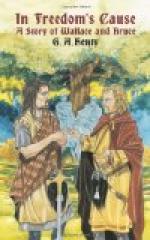During the years which had elapsed since the battle of Methven, Bruce had never been enabled to collect a force in any way worthy of the name of an army. His enterprises had been a succession of daring feats performed by small bodies of men. Even now, when the nobles dared no longer openly oppose him, they remained sullenly aloof, and the captures of the English strongholds were performed either by the king or his brother Edward, with their retainers from Annandale and Carrick; by Douglas with the men of Douglasdale; or by some simple knights like Archie Forbes, the Frazers, Boyle, and a few others, each leading their own retainers in the field. The great mass of the people still held aloof, and neither town nor country sent their contingents to his aid. This was not to be wondered at, so fearfully had all suffered from the wholesale vengeance of Edward after the battle of Falkirk.
Great successes had certainly attended Bruce, but these had been rendered possible only by the absence of any great effort on the part of England, and all believed that sooner or later Edward would arouse himself, and with the whole strength of England, Ireland, and Wales again crush out the movement, and carry fire and sword through Scotland. Still the national spirit was rising.
Archie Forbes divided his time pretty equally between the field and home, never taking with him, when he joined the king, more than a third of the entire strength of his retainers; thus all had time to attend to their farms and the wants of their families, and cheerfully yielded obedience to the call to arms when the time came.
One day while the king was stopping for a few days’ rest at Aberfilly, a horseman rode in.
“I have great news, sire,” he said. “Linlithgow has been captured from the English.”
“That were good news indeed,” the king said; “but it can scarce be possible, seeing that we have no men-at-arms in the neighbourhood.”
“It has been done by no men-at-arms, my liege,” the messenger said; “but as Forfar was taken by Phillip the Forester and his mates, so has Linlithgow been captured by a farmer and his comrades, one William Bunnock.”
It was indeed true. The castle of Linlithgow, forming as it did a link between the two strongholds of Edinburgh and Stirling, was a place of great importance and was strongly garrisoned by the English. Naturally the whole country round suffered severely from the oppressions of the garrison, who supplied themselves by force with such provisions and stores as were needful for them. Payment was of course made to some extent, as the country otherwise would speedily have been deserted and the land left untilled; but there was almost necessarily much oppression and high handedness. Bunnock, hearing of the numerous castles which had been captured by the king and his friends with mere handfuls of followers, determined at last upon an attempt to expel the garrison of Linlithgow.




